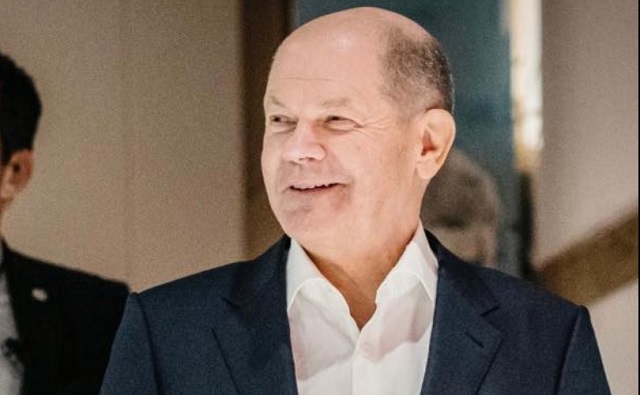International
German parliament passes law allowing minors to change their legal gender once a year

Olaf Scholz
From LifeSiteNews
“An exception to the unrestricted change of gender entry applies to men if the request for change is obviously in connection with an impending conscription in case of national defense,” the NZZ article states. “In such a case, the gender entry cannot be changed. Men must then remain men.”
The German parliament has passed the so-called “self-identification law,” which allows people confused about their sex, including minors, to change their legal gender once per year.
A vote in the Bundestag (German federal parliament) on April 12 saw the law passed as 374 MPs voted in favor, 251 voted against, and eleven MPs abstained.
The new legislation, proposed by Germany’s left-wing government coalition, will allow anyone to change his or her legal gender entry once per year by simply stating their desire to do so to the registry office. Parents can decide to change the legal gender of their children under the age of 14 with their offspring’s “consent.”
Minors between the ages of 14 and 18 can apply to change their gender entry themselves but will need their parents’ consent. However, in the case of a disagreement between parents and their children, a family court can make a decision based on the “best interests of the child.”
Leaked communications of top pro-LGBT doctors have shown that so-called “gender-affirming care” can cause severe mental and physical disease and that it is impossible for minors to give “informed consent” to it.
These doctors “indicate repeatedly that they know that many children and their parents don’t understand the effects that puberty blockers, hormones, and surgeries will have on their bodies,” journalist Michael Shellenberger wrote in his summary of the leaked files. “And yet, they continue to perform and advocate for gender medicine.”
While the “self-identification law” does not include any provisions on medical interventions such as gender surgeries or puberty blockers, a website established by the German government has promoted blockers and hormone injections for gender-confused children.
The head and co-founder of the German pro-family organization DemoFürAlle, Hedwig von Beverfoerde, criticized the new law and pointed out that “socially transitioning” by changing one’s name and legal gender increases the likelihood that minors will go down the path of medical “transition,” even though most children and adolescents grow out of their gender-confusion once they hit adulthood.
“With the passing of the Self-Determination Act, thousands of children and young people with identity conflicts will be at the mercy of the lure of the trans lobby,” von Beverfoerde warned.
“Even if the [German] government claims that the SBGG [self-determination law] has nothing to do with trans-medical measures, this law removes all protective barriers.”
“This is happening at a time when more and more countries are banning the use of puberty blockers, and the evidence from studies is becoming increasingly clear. Most recently, for example, a comprehensive study commissioned by the British Health Service (‘Cass Review’) shows that social transition with name and pronoun changes fuels medical transition and that most young people reconcile with their biological gender if they are given sufficient time to think about it,” she continued.
Von Beverfoerde concluded by calling on the German government to ban puberty blockers, cross-sex hormone injections, and surgical interventions for minors.
READ: UK’s National Health Service to stop prescribing puberty blockers to gender-confused children
Chancellor Olaf Scholz from the Social Democratic Party (SPD) welcomed the law: “We show respect for transgender, intersex and non-binary people – without taking anything away from others.”
“This is how we continue to drive forward the modernization of our country,” he added.
The law was criticized by the politicians from the Christian Democrats (CDU/CSU), the Alternative for Germany (AfD), and the Bünsdnis Sarah Wagenknect (BSW).
AfD MP Martin Reichardt said the law was “ideological nonsense” promoted by “trans-extremists” and that his party rejected the “ludicrous law” in its entirety.
Under the new law, anyone who reveals the former name or true gender of someone who changed their legal registry can be fined up to € 10,000 ($ 10,672) if they share this information “with the intent to harm.”
However, as a report by the newspaper NZZ points out, in the case of war, gender ideology has to take a back seat.
“An exception to the unrestricted change of gender entry applies to men if the request for change is obviously in connection with an impending conscription in case of national defense,” the NZZ article states. “In such a case, the gender entry cannot be changed. Men must then remain men.”
The Self-Determination law is due to come into force on November 1, 2024.
Business
Canada’s critical minerals are key to negotiating with Trump

From Resource Works
The United States wants to break its reliance on China for minerals, giving Canada a distinct advantage.
Trade issues were top of mind when United States President Donald Trump landed in Kananaskis, Alberta, for the G7 Summit. As he was met by Prime Minister Mark Carney, Canada’s vast supply of critical minerals loomed large over a potential trade deal between North America’s two largest countries.
Although Trump’s appearance at the G7 Summit was cut short by the outbreak of open hostilities between Iran and Israel, the occasion still marked a turning point in commercial and economic relations between Canada and the U.S. Whether they worsen or improve remains to be seen, but given Trump’s strategy of breaking American dependence on China for critical minerals, Canada is in a favourable position.
Despite the president’s early exit, he and Prime Minister Carney signed an accord that pledged to strike a Canada-US trade deal within 30 days.
Canada’s minerals are a natural advantage during trade talks due to the rise in worldwide demand for them. Without the minerals that Canada can produce and export, it is impossible to power modern industries like defence, renewable energy, and electric vehicles (EV).
Nickel, gallium, germanium, cobalt, graphite, and tungsten can all be found in Canada, and the U.S. will need them to maintain its leadership in the fields of technology and economics.
The fallout from Trump’s tough talk on tariff policy and his musings about annexing Canada have only increased the importance of mineral security. The president’s plan extends beyond the economy and is vital for his strategy of protecting American geopolitical interests.
Currently, the U.S. remains dependent on China for rare earth minerals, and this is a major handicap due to their rivalry with Beijing. Canada has been named as a key partner and ally in addressing that strategic gap.
Canada currently holds 34 critical minerals, offering a crucial potential advantage to the U.S. and a strategic alternative to the near-monopoly currently held by the Chinese. The Ring of Fire, a vast region of northern Ontario, is a treasure trove of critical minerals and has long been discussed as a future powerhouse of Canadian mining.
Ontario’s provincial government is spearheading the region’s development and is moving fast with legislation intended to speed up and streamline that process. In Ottawa, there is agreement between the Liberal government and Conservative opposition that the Ring of Fire needs to be developed to bolster the Canadian economy and national trade strategies.
Whether Canada comes away from the negotiations with the US in a stronger or weaker place will depend on the federal government’s willingness to make hard choices. One of those will be ramping up development, which can just as easily excite local communities as it can upset them.
One of the great drags on the Canadian economy over the past decade has been the inability to finish projects in a timely manner, especially in the natural resource sector. There was no good reason for the Trans Mountain pipeline expansion to take over a decade to complete, and for new mines to still take nearly twice that amount of time to be completed.
Canada is already an energy powerhouse and can very easily turn itself into a superpower in that sector. With that should come the ambition to unlock our mineral potential to complement that. Whether it be energy, water, uranium, or minerals, Canada has everything it needs to become the democratic world’s supplier of choice in the modern economy.
Given that world trade is in flux and its future is uncertain, it is better for Canada to enter that future from a place of strength, not weakness. There is no other choice.
International
Trump puts new price tag on Canada joining “Golden Dome”

Quick Hit:
President Trump has upped the cost for Canada to join the U.S. “Golden Dome” missile defense program to $71 billion—$10 billion more than his previous ask.
Key Details:
- Trump confirmed the new $71 billion figure while speaking to reporters aboard Air Force One.
- Canada has pushed back, with PM Mark Carney and diplomats calling Trump’s offer a “protection racket.”
- Trump said Canada could access the system for free if it became the 51st U.S. state.
Diving Deeper:
President Trump has put a new and steeper price on Canada’s potential entry into America’s “Golden Dome” missile defense program. Speaking from Air Force One on Monday, Trump told reporters, “They want to be in… Seventy-one billion they’re going to pay.”
That’s a $10 billion increase from the $61 billion figure Trump had previously floated, marking a sharp escalation in his negotiations with Ottawa. The Golden Dome, described by the administration as a “state-of-the-art” defense shield, aims to protect North America from a new era of missile threats—particularly those posed by China, Russia, and North Korea.
Trump has framed the Golden Dome as the long-awaited realization of Ronald Reagan’s “Star Wars” vision, using space-based sensors and interceptors to strike down incoming ballistic, cruise, or hypersonic missiles. Development timelines suggest full deployment is still 5–7 years off, but an initial $25 billion is already allocated in next year’s defense budget. The entire project may run upwards of $175 billion, with some estimates as high as $542 billion over 20 years.
Canada, which has long partnered with the U.S. under NORAD to detect airborne threats, has expressed interest in joining the project. But Trump is demanding a separate, costly buy-in. He reiterated that Ottawa would “have to pay a lot of money” to participate unless it pursued a full political union with the U.S. “It would be free if Canada became the 51st state,” he added.
Canadian leaders have pushed back hard. Prime Minister Mark Carney, re-elected in April after campaigning against U.S. interference, said Canada wants to protect its citizens but not under terms dictated from Washington. Ambassador to the U.N. Bob Rae went further, calling Trump’s offer a “protection racket.”
-

 Business1 day ago
Business1 day agoThe CBC is a government-funded giant no one watches
-

 conflict2 days ago
conflict2 days agoTrump leaves G7 early after urging evacuation of Tehran
-

 conflict1 day ago
conflict1 day agoMiddle East clash sends oil prices soaring
-

 Crime2 days ago
Crime2 days agoUK finally admits clear evidence linking Pakistanis and child grooming gangs
-

 Also Interesting2 days ago
Also Interesting2 days agoHow to Use Bonuses at Magius Casino and Similar Websites
-

 conflict1 day ago
conflict1 day agoTrump Threatens Strike on Khamenei as Israel Pounds Iranian Military Command
-

 Alberta1 day ago
Alberta1 day agoAlberta is investing up to $50 million into new technologies to help reduce oil sands mine water
-

 Business1 day ago
Business1 day agoTrump makes impact on G7 before he makes his exit






